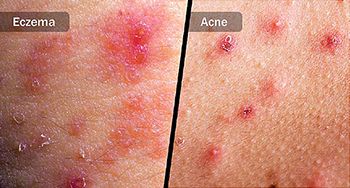Eczema vs. Acne: Which Is It?
Eczema vs. Acne: Which Is It?
Red, inflamed skin is easy to spot. What can be hard to figure out is the cause of your breakout. It may be acne, but it could also be eczema. Here's how to tell which skin condition you have so you can get it under control.
How Are They Alike?
Both are common skin problems that can happen at any age. Each can flare, go away for a while, then return. And both these skin issues can be stressful and embarrassing.
But acne and eczema are different in many ways.
Eczema
 Eczema, or what's sometimes called atopic dermatitis, is an autoimmune condition. That means it's caused by a problem with your immune system. Doctors don't know why it happens, but your skin doesn't make as many fats and oils as it should and has a hard time holding on to moisture.
Eczema, or what's sometimes called atopic dermatitis, is an autoimmune condition. That means it's caused by a problem with your immune system. Doctors don't know why it happens, but your skin doesn't make as many fats and oils as it should and has a hard time holding on to moisture.
You're more likely to get it if it runs in your family or you or any family members have allergies, hay fever, or asthma.
Eczema can happen anywhere on your body. Babies and children are more likely to have it on their faces. It can look different from person to person. Some people get rough, leathery skin, while others have red or brownish-gray patches or small raised bumps on parts of their body. Swelling, oozing, and crusting are other signs. But the most common symptom of eczema is itchy skin.
Acne
Acne affects the oil glands under your skin. When the tunnels that connect those glands to small holes on your skin's surface (pores) get clogged, a pimple grows. Sometimes, these bumps have pus in them and hurt.
Acne breakouts most often happen on your face, neck, back, and shoulders.
You're more likely to get acne if:
- Your parents had acne
- You take certain medications, including steroids (powerful drugs that help with inflammation)
- You wear greasy makeup
- You're under stress
- Your hormones change (like during puberty, pregnancy, and menopause)
Diagnosis
You won't need a lab test to know if you have acne or eczema. A dermatologist (skin doctor) will be able to tell which you have by looking at your skin and asking about your family history.
Treatment
How it's treated depends on which skin problem you have:
Eczema: There's 100% cure for eczema, and we will ease your pain and itching and keep your skin from getting worse.
We suggest the combination of Natural food supplements,which helps you to cleanse your skin deeply. Its 100 % Natural and it has No Side effect.
Home Care
Taking good care of your skin can help control both eczema and acne. These things can help:
Be gentle. Use a mild soap to wash your skin at least twice a day and after sweaty exercise. Go easy. Scrubbing or using harsh cleaners can make it worse.
Try not to touch the area. If you have itchy eczema, try not to scratch. This can break your skin and lead to infections. If you have pimples, don't pick or pop them.
Stay safe in the sun. Some drugs for eczema and acne make your skin burn faster. Try to stay out of the sun between 10 a.m. and 4 p.m. when the sun's UVB burning rays are most intense.
If you have eczema, use a mineral-based sunscreen with zinc oxide or titanium dioxide. People with acne do best with a brand that's oil-free or "non-comedogenic," meaning it won't block your pores.
Relax. Stress and anxiety can make both acne and eczema flare. Try meditation, take a yoga or tai chi class, or find other ways to calm yourself.




Comments
Post a Comment